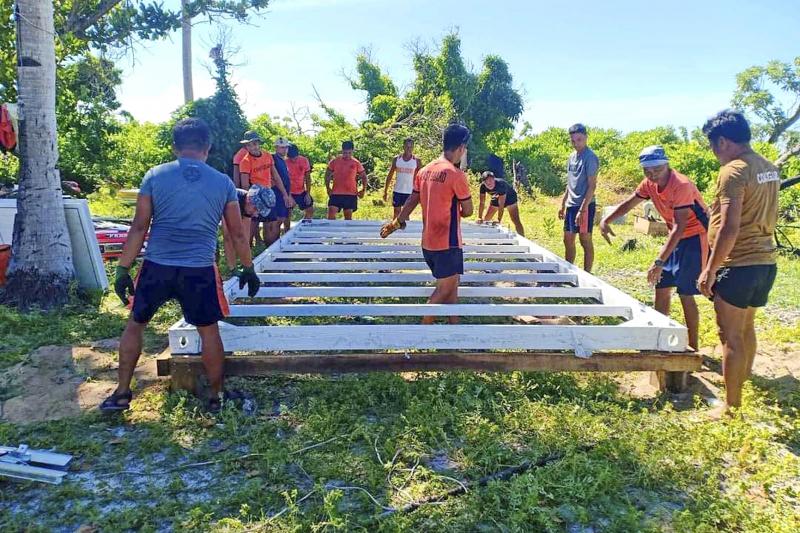China is holding military exercises in the disputed South China Sea coinciding with US President Joe Biden’s visits to South Korea and Japan that are largely focused on countering the perceived threat from Beijing.
The Chinese Maritime Safety Administration office in Hainan Province said the drills began on Thursday and are to continue through Monday.
It said other aircraft and vessels would be prohibited from entering the area, but gave no further details.

Photo: AP / Philippine Coast Guard
China claims the South China Sea virtually in its entirety and the crucial waterway has become a potential flashpoint for conflict in Asia. To assert its claim, it has built airstrips and other military infrastructure atop artificial islands built on coral reefs and atolls. Taiwan, Brunei, Malaysia, the Philippines and Vietnam also exercise overlapping claims in the South China Sea.
Since the beginning of the month, China’s first aircraft carrier, the Liaoning, has been conducting a mission in the Sea of Japan. The Chinese Ministry of National Defense described it as “routine training” aimed at boosting performance that is “in line with relevant international law and international practice, and not targeting any party.”
China also flew a pair of long-range nuclear-capable H-6 bombers through the area on Wednesday, Chinese media reports said.
Meanwhile, the aircraft carrier USS Ronald Reagan and its strike group left their home port at Yokosuka, Japan, for a “routine at-sea period,” the US 7th Fleet said.
The ships and the carrier air wing “are expected to work with allies and partners, promote adherence to a rules-based international order, as well as maintain presence and flexibility to meet the needs of the US Department of Defense,” the US Navy said.
The Philippine Coast Guard yesterday said it had established outposts on three islands in the disputed South China Sea to monitor ship movements and promote safety.
Philippine Coast Guard Admiral Artemio Manalo Abu said the outposts on the West York and Nanshan islands and Northeast Cay, which were established this week, would be staffed by coast guard personnel and equipped with radio communications to report any incidents.
Abu did not specify how many personnel would be stationed at the new outposts, but said it is the largest deployment in the disputed region so far.
“Through these command observation posts, we improve our capabilities in promoting maritime safety, maritime search and rescue, and marine environmental protection,” Abu said in a statement.

CALL FOR SUPPORT: President William Lai called on lawmakers across party lines to ensure the livelihood of Taiwanese and that national security is protected President William Lai (賴清德) yesterday called for bipartisan support for Taiwan’s investment in self-defense capabilities at the christening and launch of two coast guard vessels at CSBC Corp, Taiwan’s (台灣國際造船) shipyard in Kaohsiung. The Taipei (台北) is the fourth and final ship of the Chiayi-class offshore patrol vessels, and the Siraya (西拉雅) is the Coast Guard Administration’s (CGA) first-ever ocean patrol vessel, the government said. The Taipei is the fourth and final ship of the Chiayi-class offshore patrol vessels with a displacement of about 4,000 tonnes, Lai said. This ship class was ordered as a result of former president Tsai Ing-wen’s (蔡英文) 2018

‘SECRETS’: While saying China would not attack during his presidency, Donald Trump declined to say how Washington would respond if Beijing were to take military action US President Donald Trump said that China would not take military action against Taiwan while he is president, as the Chinese leaders “know the consequences.” Trump made the statement during an interview on CBS’ 60 Minutes program that aired on Sunday, a few days after his meeting with Chinese President Xi Jinping (習近平) in South Korea. “He [Xi] has openly said, and his people have openly said at meetings, ‘we would never do anything while President Trump is president,’ because they know the consequences,” Trump said in the interview. However, he repeatedly declined to say exactly how Washington would respond in

WARFARE: All sectors of society should recognize, unite, and collectively resist and condemn Beijing’s cross-border suppression, MAC Minister Chiu Chui-cheng said The number of Taiwanese detained because of legal affairs by Chinese authorities has tripled this year, as Beijing intensified its intimidation and division of Taiwanese by combining lawfare and cognitive warfare, the Mainland Affairs Council (MAC) said yesterday. MAC Minister Chiu Chui-cheng (邱垂正) made the statement in response to questions by Democratic Progressive Party (DPP) Legislator Puma Shen (沈柏洋) about the government’s response to counter Chinese public opinion warfare, lawfare and psychological warfare. Shen said he is also being investigated by China for promoting “Taiwanese independence.” He was referring to a report published on Tuesday last week by China’s state-run Xinhua news agency,

‘ADDITIONAL CONDITION’: Taiwan will work with like-minded countries to protect its right to participate in next year’s meeting, the foreign ministry said The US will “continue to press China for security arrangements and protocols that safeguard all participants when attending APEC meetings in China,” a US Department of State spokesperson said yesterday, after Beijing suggested that members must adhere to its “one China principle” to participate. “The United States insists on the full and equal participation of all APEC member economies — including Taiwan — consistent with APEC’s guidelines, rules and established practice, as affirmed by China in its offer to host in 2026,” the unnamed spokesperson said in response to media queries about China putting a “one China” principle condition on Taiwan’s